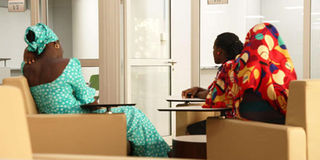Herculean task of rehabilitating freed Boko Haram captives begins

Three teenagers who escaped a Boko Haram mass kidnapping in the northeast Nigerian town of Chibok last year are seen at the American University of Nigeria, in the Adamawa state capital, Yola, on May 8, 2015. Deborah The easy part, could perhaps have been rescuing them – the more difficult psychological challenge is rehabilitating them back into society. PHOTO | AFP
What you need to know:
- The task of healing and reintegrating these women back into society remains an arduous one. Many of them have lost their husbands, fathers and sons who were killed by Boko Haram.
- This initial group was fortunate. The Gabasawa Initiative and another NGO arranged for them to begin a new life outside Nigeria. They are now in school abroad.
- This last group rescued may not be as lucky. Many of them are scarred by what they experienced from Boko Haram. Forced labour, sexual and psychological abuse was the order of the day.
A week after Nigeria’s military rescued more than 500 women and children from Sambisa forest, the government is still working on ascertaining the identities of those found.
The Chibok girls are not among them. It should not matter, however, from where those rescued hail from.
The important part, as Nigeria’s military spokesperson Major General Chris Olakulode said, is that citizens held captive under severe and inhumane treatment had now been freed.
The easy part, could perhaps have been rescuing them – the more difficult psychological challenge is rehabilitating them back into society.
The United Nations Population Fund’s Nigerian Executive Director is on record as saying that about 215 girls rescued are pregnant. Many others arrived weak and malnourished and are receiving medical care in camps set up for the group.
The task of healing and reintegrating these women back into society remains an arduous one. Many of them have lost their husbands, fathers and sons who were killed by Boko Haram.
The story of Hanatu Dauda and Mrs Mary Muse, two mothers of the missing schoolgirls I met and spoke to in Lagos, perhaps mirrors the life of many of the women in the North and their suffering in the last one year.
PALE SHADOWS
The two are not from Chibok, although their daughters went to school there. They hail from Mbalala, a distance that costs about 500Naira from Chibok.
Many of the missing schoolgirls came from as far as Jeljel, Payesu, Gatamwana, Leho and Kautikari local government areas.
Yet Chibok was prominent as it was the seat of the local government.
Hanatu and Mary had come to Lagos for medical treatment under the auspices of the Gabasawa Women and Child Initiative, an NGO that works with women in the North.
Doctors at the clinic where they were treated found them to be anaemic and weak, a former pale shadow of themselves.
Even for those living in their homes, freedom is a relative word. Food is hard to come by as farms were abandoned long ago.
No one sleeps well at night and they still run off into the forest for fear of a new onslaught from the fighters.
Hanatu’s husband has two other wives and thirteen children. He earns a salary of N10, 000 and works in a different town, which means that he cannot adequately support his family.
His wife does not sleep well at night thinking of her daughter still in the forest.
Mrs Doris Yaro, founder of Gabasawa Initiative knows only too well the challenge of rehabilitating the rescued women.
In 2014, she received five of the Chibok girls who escaped from Sambisa forest, the last one arriving six months after the abductions.
She was the last of the Chibok girls known to have left Sambisa, having been ‘released’ on humanitarian grounds by Boko Haram.
She was heavily pregnant.
PSYCHOLGICAL ABUSE
“The work of reintegrating these girls into society is not easy. Many of them who have returned are very afraid and weak,” Mrs Yaro said.
The girls could not eat when they first arrived in Lagos from Sambisa forest, which is said to be approximately 60,000 square kilometres. Mrs Yaro said she encouraged them to.
Slowly by slowly they built their lives back – urged on by counselling, medical therapy and the kindness of families that opened their homes.
The interview is punctuated by tears, moments of silence and deep thoughts.
This initial group was fortunate. The Gabasawa Initiative and another NGO arranged for them to begin a new life outside Nigeria.
They are now in school abroad.
This last group rescued may not be as lucky. Many of them are scarred by what they experienced from Boko Haram. Forced labour, sexual and psychological abuse was the order of the day.
Some of those interviewed narrated how they were forced to fight alongside the group.
The continuing release of the women is one step in uncovering one of Nigeria’s silent mysteries – that of abductions of women and children in the north.




